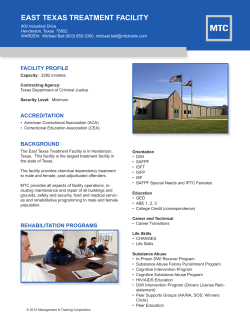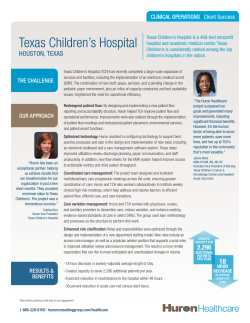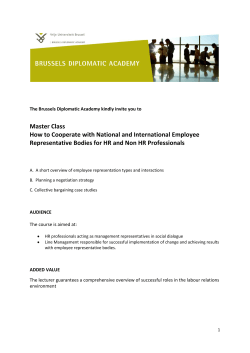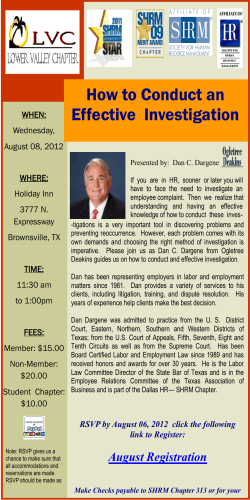
What is Staff Development Anyway? 2012-2013 HPISD Staff Development Expectations
2012-2013 HPISD Staff Development Expectations What is Staff Development Anyway? Staff development refers to a systematically planned, comprehensive set of professional learning opportunities carried out over time to achieve specific district-wide, campus, and department improvement objectives. The ultimate goals of our staff development process are increased student learning and engagement, and continuous improvement for all employees as they work together to create a quality environment for our students ensuring a culture of professional learning communities throughout the district. The Highland Park ISD School Board and staff recognize that well-trained personnel are essential to the effective operations of a school district. Professional development is a necessary, continuous, and systematic effort to improve district programs by involving all employees in learning opportunities, whether as a participant or trainer. These opportunities will enhance teachers’ performance, knowledge, and attitudes. The focus of our staff development program activities is to provide district personnel with the knowledge and skills to impact school improvement for each student. Staff Development Expectations In order to achieve these goals, the HPISD staff has certain expectations that must be fulfilled for continuous employment. Sessions will provide an opportunity for reflection and evaluation to ensure continuous improvement. Additionally, all employees will complete specific annual legal, state and federal compliance courses using the District's approved online training application (Public School Works). Each year staff members should plan for professional growth activities that will help them complete their required training. Each staff member should look at the long-range planning grid and map-out his or her training plan to be completed during the next five years. The following expectations for professional development reflect the mission of the district: I. Curriculum Implementation and Innovation Professional development for innovation and implementation in the area of curriculum relies on research-based strategies to support concept-based learning. Participation in curriculum writing cadres is one of the most important opportunities for professional learning. Other curriculum-related learning includes: Highland Park Multisensory Approach to Language Arts (HPMALA) All K-2 teachers who teach language arts, dyslexia/reading teachers, and K-6 special education teachers who will be teaching language arts TEKS are expected to participate. Completion of this program is required. Writing All teachers, who teach English and Language Arts as part of their curriculum, are expected to attend within five years of their employment the Abydos Learning International Writing Institute (previously New Jersey Writing Project in Texas). Participants will be given 90 staff development hours by attending this three-week training. A total of 18 gifted and talented hours will be awarded (12 hours of Curriculum/Differentiation and 6 hours of Other) for GT. Participants may also apply for 6 hours of graduate credit through approved universities but must pay their own tuition for those credit hours. The Abydos Learning Writing Institute, which is offered during the summer, is beneficial to all HPISD educators; therefore, all educators are welcome to attend. Comprehensive Literacy Strategies The district will offer numerous opportunities throughout the school year and the summer for professional development in the framework of comprehensive literacy and assessments such as Developmental Reading Assessment (DRA). All teachers, including Special Program teachers, who teach reading and writing as part of their curriculum are encouraged to participate. Comprehensive Array of Math and Science Training The district will offer numerous opportunities throughout the school year and the summer for professional development for math and science teachers, who are encouraged to participate. Training will be offered that provides opportunities to learn lesson delivery using inquiry models. Specialized Content Training From time to time, the district will also offer specialized training for content-area teachers and clerical/support staff, who are required to attend the appropriate training. Teachers New to District All teachers new to HPISD will participate in a New Teacher Orientation that will focus on teaching and learning systems and the mission of our district. II. Engagement All instructional staff members are expected to complete foundations training in the framework for increasing student engagement. Additional learning opportunities may include the application of design qualities, authentic learning and the inquiry model. III. Differentiation Teachers are expected to seek learning opportunities to develop fluency in differentiating content, context, and products for students according to their varied interests and learning profiles. Listed below are a variety of learning opportunities for teachers: Instructional Differentiation All teachers are encouraged to participate in professional development opportunities to plan and implement classroom strategies for varying content, context and products. Talented and Gifted (TAG) All TAG teachers (K-1, TAG specialists/teachers and campus principals) must have 30 hours of TAG training before their first day of instruction. Teachers who have not earned a full 30 hours of TAG training by September 1 may be required to take the GT EXCET. To maintain the GT professional development certificate, a six-hour update is required each year. (Required groups: All kindergarten and 1st grade teachers, all TAG specialists/teachers, all teachers in grades 5–12 who teach a TAG class, administrators and counselors.) All teachers must satisfy the district requirement of six hours of training in Nature and Needs of Gifted Students. 19 TAC 89.2 DMA (LEGAL) Special Education All teachers and all paraprofessionals are expected to receive a general overview of characteristics of and educational implications for students with special needs. Required trainings will be offered on an ongoing basis. English Language Learners All teachers and paraprofessionals who work with students whose native language is not English must receive training in instructional strategies, curriculum and use of resources for the English Language Learner (ELL). Required trainings will be offered on an ongoing basis. Advanced Placement Training (AP) Initial content-specific training is required in accordance with College Board standards with update training every three years. A total of 18 talented and gifted hours in the area of Curriculum and Instruction will be awarded to the participants. IV. Assessment Professional development related to assessment emphasizes the development and implementation of various local and state assessments, as well as the development of data disaggregation techniques to support continuous improvement. Additionally, professional learning related to assessment should support the implementation of a balanced model of Assessment OF and FOR Learning. Training opportunities include the following: Texas Primary Reading Inventory (TPRI) All teachers who administer the Texas Primary Reading Inventory (TPRI), as well as elementary dyslexia/reading specialist and elementary special education teachers are expected to attend the TPRI training and TPRI software training. Training will be offered according to state initiated updates. Assessment Literacy Training and Data Analysis All instructional staff members are encouraged to attend training sessions as required by campus leadership. Training will include data disaggregation, data analysis, grading, reporting and Assessment OF and FOR Learning strategies. V. Collaboration The development of professional learning communities depends on learning to support collaborative activities and the development of a collaborative culture. Training and collaborative opportunities include the following: Mentoring All teachers selected as mentors of new teachers are expected to attend mentor training as they work with new teachers. Orientations and follow-up training sessions will be designed annually to assist new teachers as they learn about the HPISD system. Training will be offered each year and required for all mentors of newly-hired teachers. HPISD/SMU 21st Century Global Competency Partnership HPISD Global Connections and SMU partnership committee are developing a course that aims to help teachers develop their personal global competencies for the 2012-2013 school year. Leadership Staff members are encouraged to attend leadership training and to serve as leaders in various capacities. Examples of leadership training, skills and attributes are kindness and compassion, empathy, resiliency, service, engaged citizen, ethical decision making, facing challenges, academic leadership, cadre leaders, Training of Trainers, District Design Team, and Campus Design Team. VI. Technology As we continue to transform the workplace and classroom environments into communities of life-long learning, technology provides an engaging and foundational tool for information problem solving. To model this collaborative learning, teachers and staff are encouraged to participate in all facets of technological learning opportunities from individual online courses and tutorials to professional development social networks. The following are guidelines to assist in choosing appropriate professional development in technology: 21st Century Technology Self-Assessment All instructional staff are expected to complete the 21st century technology selfassessment annually. This tool will be a guide to assist in the design of each instructor's self-directed professional development plan. National Education Technology Standards for Students, Teachers and Administrators (NETS-S, NETS-T, NETS-A) All instructional staff are expected to model instructional design after the NETS-T to provide rich, rigorous, relevant work that engages students in 21st century learning products and that reflects each student's thorough understanding of the NETS-S for global use. School Technology and Readiness Chart All instructional staff are expected to complete the Texas School Technology And Readiness (STAR) chart annually. In addition, the State Board of Education requires all instructional staff to integrate Technology Application Texas Essential Knowledge and Skills (TEKS) into their curriculum. Innovative Professional Development in Instructional Technology Professionals, paraprofessionals and administrators are expected to participate in ongoing training and professional development opportunities such as conferences/workshops, seminars, technology integration academies, teacher mentoring/collaboration and modeling of best practices, as well as online professional development. Responsible Use All HPISD employees are required to complete an online tutorial through Public Works on the ethical and responsible use of technology in the district. All HPISD employees who have access to the network must have a signed Responsible Use Policy on file. VII. Legal and Compliance Requirements State-Assessment Training All versions of the Texas Assessment of Knowledge and Skills (TAKS) / State of Texas Assessment of Academic Readiness (STAAR) require training of everyone involved in the assessment process. The STAAR-Alt Assessment and TELPAS Assessment require additional training and qualification activities. Self-Directed Appraisal System (SDAS) All educators who are appraised with the Self-Directed Appraisal System (SDAS) must participate in training related to the implementation of SDAS. All administrators who appraise teachers must complete the required SDAS training orientation for supervisors. Update training is required. Professional Development Appraisal System (PDAS) All educators who are appraised with the Professional Development Appraisal System (PDAS) must participate in an orientation before being appraised by their supervisor. All administrators who appraise teachers must complete the required PDAS training for supervisors. Update training may be required from time to time. Texas Behavior Support Initiative (TBSI) & Restraint Training For Campus Crisis Teams and other staff members as needed: HPISD will address the provisions of the Texas Education Code (TEC); 37.0021, 19 T.A.C. Chapter 89 of confinement, restraint, seclusion, and time-out through The Texas Behavior Support Initiative (TBSI) Training. Principals will designate staff members to serve on that campus core team. A core team of personnel on each campus, including the principal or designee, must receive TBSI training and Crisis Prevention/Intervention (CPI) which is the Highland Park ISD designated program for restraint training. A yearly update of CPI is required for core team members to remain certified. Training in the modular design of TBSI is required for general or special education personnel who implement seclusionary time-out based on requirements established in a student's IEP and BIP. Personnel who have not been trained must attend TBSI/CPI within 30 school days of being assigned the responsibility for implementing seclusionary time-out based on an IEP/BIP. Personnel called upon to use restraint in an emergency and who have not received prior training must receive that training in the first 30 days of employment. Other State and Federal Required Training through Public School Works All school districts must provide employees initial training and annual refresher training regarding: •Bloodborne Pathogens •Sexual Harrassment •Mandatory Child Abuse Reporting •Bullying •CPR/Automatic External Defibrillator (AED) •Responsible Use Agreement •Employee Handbook and Board Policy Agreement Individual Staff Development Plans Individual Development Plans (IDP) and Exchange Time In order to receive exchange hours for training achieved during non-contract time, all HPISD staff will complete an Individual Staff Development Plan. Plans must be preapproved by the campus principal or designee. A full day of training or 6 hours will be considered equivalent to one day of exchange time. Plans will be submitted and approved in May before the next school year so that summer training may count towards exchange days in the upcoming school year. A supervisor may recommend certain sessions for staff members to attend in order to receive exchange time. All staff development approved by the district will count towards professional development hours. The district will track all locally provided staff development. Staff members are responsible for keeping track of hours gained outside the district. Proof of attendance is required.
© Copyright 2025











